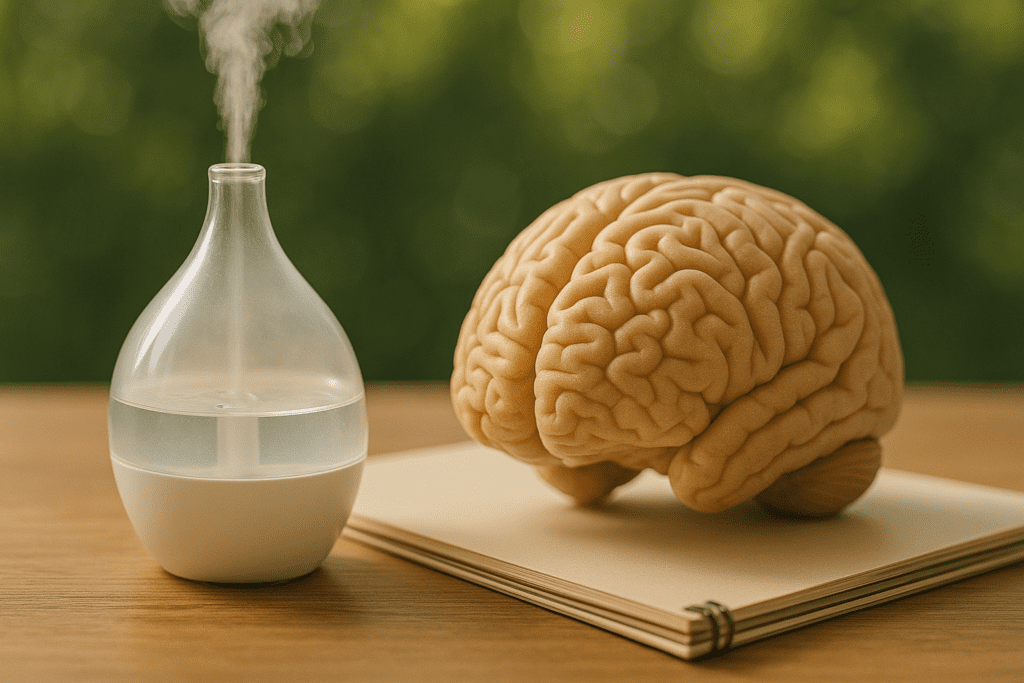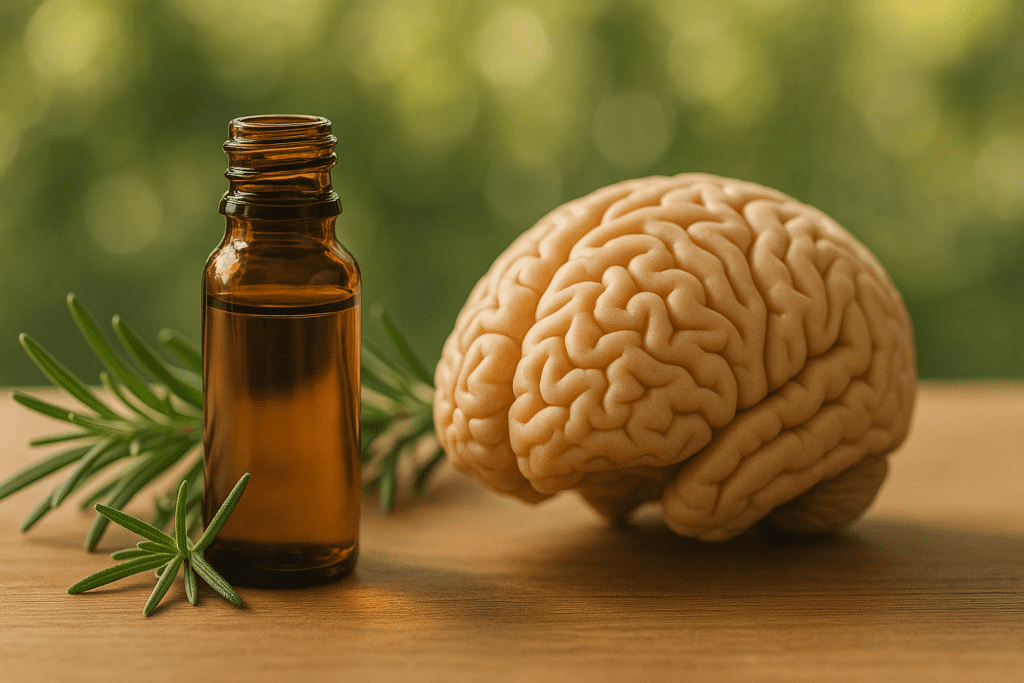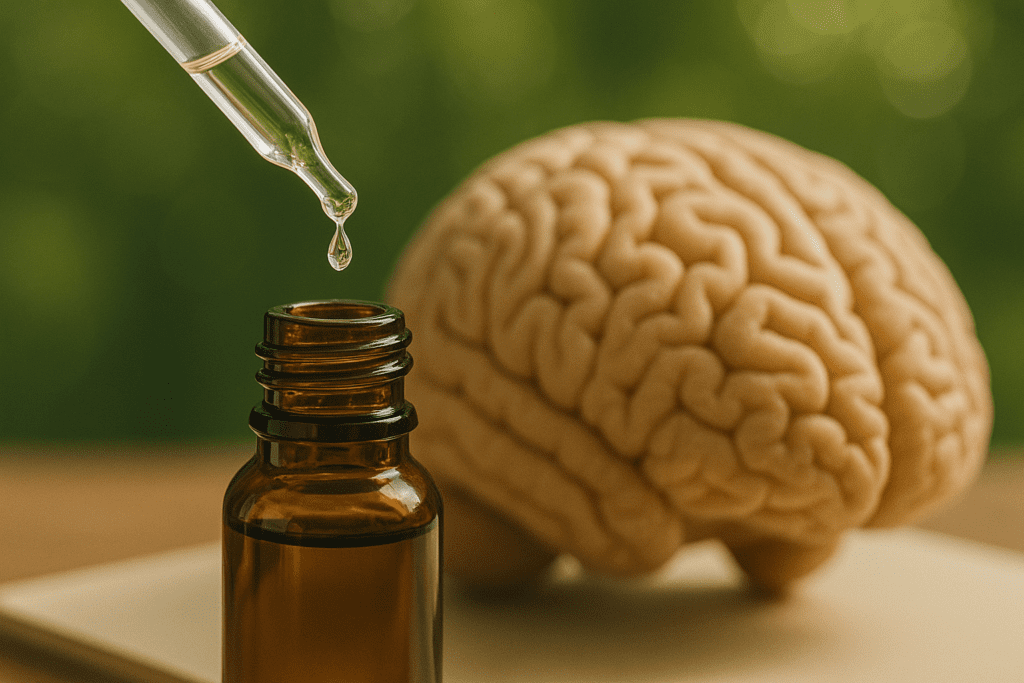In a world of constant distraction and relentless demands, maintaining mental clarity and cognitive efficiency has never been more critical. Many people are turning to natural strategies to support their focus and productivity without resorting to stimulants or synthetic interventions. Among the most promising of these methods is the use of essential oils. While often associated with relaxation and mood support, essential oils also offer scientifically backed benefits for attention, alertness, and mental performance. In this article, we explore the compelling evidence behind essential oils for focus and productivity, how they influence brain function, and practical strategies to harness their cognitive-enhancing power in everyday life.
You may also like: Best Natural Supplements and Vitamins to Improve Focus Backed by Science and Expert Insight
Understanding the Neuroscience of Focus and Cognitive Fatigue
Focus is not simply about willpower—it is deeply rooted in brain chemistry. Attention, memory, and motivation are regulated by a complex interplay of neurotransmitters such as dopamine, norepinephrine, and acetylcholine. These chemical messengers facilitate communication between neurons and help the brain filter out irrelevant stimuli while enhancing signal clarity for tasks that matter.
When these systems become dysregulated—often due to stress, lack of sleep, poor nutrition, or overstimulation—mental fatigue sets in. You may notice difficulty concentrating, slower processing speed, or a tendency to procrastinate. Fortunately, certain natural compounds found in essential oils interact with these very neurotransmitter pathways, supporting optimal cognitive performance. Scientific studies have shown that specific essential oils stimulate the brain’s limbic system, the region responsible for emotion, memory, and attention, through olfactory signaling.
This biological interaction suggests that using essential oils for focus and productivity is not merely anecdotal—it is grounded in neurochemical reality. The key is choosing the right oils, using them consistently, and understanding how to apply them effectively.
The Science Behind Aromatherapy and Brain Function
Aromatherapy is more than a pleasant sensory experience—it is a powerful therapeutic approach supported by research in neuroscience and psychophysiology. Inhalation of essential oils allows aromatic compounds to interact directly with olfactory receptors in the nasal cavity, which are connected to the brain’s olfactory bulb. This area transmits signals to the limbic system and the prefrontal cortex, regions involved in decision-making, working memory, and alertness.
Studies using functional MRI and EEG have documented measurable changes in brain activity after exposure to essential oils. For example, inhaling rosemary oil has been associated with increased beta brain wave activity, indicative of heightened alertness and concentration. Similarly, peppermint essential oil has been shown to enhance cognitive performance during mentally demanding tasks by improving oxygen delivery and reducing perceived fatigue.
When exploring essential oils for productivity, it’s important to look at clinical findings rather than anecdotal claims. Randomized controlled trials have demonstrated that certain essential oils can modulate cortisol levels, reduce mental fatigue, and improve accuracy on cognitive tasks—all of which are crucial for sustained focus throughout the day.
Top Essential Oils for Focus and Productivity
Not all essential oils are created equal when it comes to enhancing mental performance. The following oils have emerged as the most effective based on scientific literature and clinical application:
Rosemary (Rosmarinus officinalis)
Rosemary oil has long been revered for its memory-enhancing properties. Research from Northumbria University in the UK found that students working in a room infused with rosemary aroma performed significantly better on memory tasks compared to those in a scent-free environment. The oil’s main active component, 1,8-cineole, has been linked to improved cognitive speed and accuracy. This makes rosemary one of the most reliable essential oils for focus and productivity, especially when used before study sessions, meetings, or complex problem-solving tasks.
Peppermint (Mentha × piperita)
Peppermint oil is known for its energizing and invigorating properties. Studies show that peppermint can improve attention span, working memory, and processing speed. A 2012 study published in the International Journal of Neuroscience found that participants who inhaled peppermint performed better on sustained attention tasks and reported feeling more alert. This makes peppermint ideal for combating mid-afternoon slumps or jumpstarting productivity during early morning work sessions.
Lemon (Citrus limon)
Citrus oils like lemon offer mood-lifting and clarifying benefits that support both mental well-being and cognitive sharpness. Lemon oil stimulates serotonin and dopamine pathways in the brain, which can help reduce mental fog and promote a sense of optimism and energy. Research also suggests that lemon oil may decrease stress-related errors and improve task accuracy under pressure, making it one of the most versatile essential oils for productivity enhancement.
Basil (Ocimum basilicum)
Sweet basil oil has shown promise in enhancing alertness and reducing mental fatigue. Its components, such as linalool and eugenol, interact with cholinergic pathways that are critical for learning and memory. Basil oil’s mild stimulant properties help sustain focus during prolonged periods of intellectual effort without the jitteriness associated with caffeine or synthetic nootropics.
Vetiver (Vetiveria zizanioides)
Vetiver, often referred to as the “oil of tranquility,” has a grounding effect on the nervous system. Although it’s more commonly used for relaxation, emerging evidence shows that vetiver may also help with attention regulation, particularly in individuals with ADHD. Its calming yet centering effects support balanced focus, making it a valuable addition to any cognitive-enhancement regimen.
Practical Ways to Use Essential Oils to Enhance Mental Clarity
The method of application plays a significant role in how effective essential oils for focus and productivity can be. Inhalation is the fastest and most direct route to the brain, but topical application and diffusion also have their place.
Using a personal inhaler or adding a drop of essential oil to a tissue allows for quick access during moments of stress or brain fog. Diffusing oils in your workspace throughout the day creates a continuous cognitive support system. For those with sensitive skin or respiratory conditions, applying diluted essential oils to pulse points such as the wrists, neck, or behind the ears provides sustained release without overwhelming the senses.
Another effective technique is “layering”—using more than one essential oil in a blend to enhance synergistic effects. For example, combining rosemary and lemon can offer both memory enhancement and mood elevation, while peppermint and basil create a blend that fosters alertness and mental stamina.
Consistency is key. Just as you wouldn’t expect results from a single meditation session or one day of exercise, incorporating essential oils into your daily routine ensures that their cognitive benefits compound over time. Morning routines, pre-task rituals, and afternoon energy resets are all ideal opportunities to use essential oils for focus and productivity in a structured, supportive way.

The Role of Olfaction in Emotional Regulation and Mental Efficiency
The nose is often overlooked as a gateway to cognitive performance, yet olfaction is intimately tied to both memory and emotion. This connection is mediated through the olfactory-limbic axis, a neural network that allows scents to influence emotional states almost instantaneously. By targeting this pathway, essential oils can modulate stress responses that interfere with mental clarity and productivity.
High stress levels are known to impair attention, reduce working memory capacity, and increase the likelihood of cognitive errors. Essential oils such as bergamot, lavender, and frankincense—while typically associated with relaxation—can help regulate cortisol, the body’s primary stress hormone. When cortisol is kept in check, the brain is more capable of sustaining focus, solving problems efficiently, and filtering distractions.
Using essential oils for productivity, then, is not merely about stimulation—it’s about creating the right neurochemical and emotional environment for optimal mental performance. Scents that calm the nervous system without sedating it allow the brain to operate in a state of relaxed alertness, the sweet spot for creativity, concentration, and flow.
Integrating Essential Oils into Your Work and Study Environment
Creating a cognitively supportive environment involves more than just having the right tools—it requires intentional design. Incorporating essential oils into your workspace can enhance alertness, improve air quality, and establish a sensory cue for entering a focused state. This technique, known as environmental anchoring, uses consistent scents to trigger a mental association with productivity.
Consider diffusing peppermint or lemon oil during your morning deep work session to signal your brain that it’s time to engage. Over time, this olfactory anchor can help reduce task-switching fatigue and increase time-on-task. Similarly, using rosemary oil before tests or presentations may help recall information more easily by reinforcing memory through scent.
For remote workers and students studying from home, essential oils offer a way to structure the day through sensory differentiation. One scent for focus, another for breaks, and yet another for wind-down time helps the brain shift between cognitive modes with greater ease and less mental resistance. This sensory structure fosters not only productivity but also emotional resilience in high-demand environments.
Addressing Skepticism: What the Evidence Really Says
Skepticism around essential oils for focus and productivity is understandable—many health trends come and go without substantial scientific validation. However, the growing body of research supporting the neurocognitive effects of essential oils is difficult to ignore. Peer-reviewed studies, neuroimaging data, and psychophysiological assessments all point to real, measurable outcomes in alertness, memory, and mood.
One systematic review published in the journal Evidence-Based Complementary and Alternative Medicine found that aromatherapy with oils such as rosemary, peppermint, and lavender significantly improved cognitive function across various study populations. While more large-scale, randomized trials are needed to fully establish clinical protocols, the existing evidence is robust enough to justify practical use, particularly when combined with other evidence-based productivity strategies.
Rather than viewing essential oils as a standalone solution, it is more accurate to see them as part of a comprehensive approach to mental performance. When paired with proper sleep, hydration, nutrition, and task management techniques, essential oils can become a valuable ally in the pursuit of sustainable cognitive excellence.
Customizing Your Cognitive Toolkit: Finding What Works for You
Individual response to essential oils varies, depending on genetic factors, olfactory sensitivity, and personal preferences. What invigorates one person may overstimulate another. This variability underscores the importance of experimenting with different oils, blends, and methods of application to find what supports your unique focus profile.
Start with one or two oils known for their cognitive benefits—such as rosemary or peppermint—and use them consistently in a structured environment. Pay attention to your focus levels, emotional state, and task performance before and after use. Journaling your observations over several weeks can reveal patterns and help refine your aromatherapy routine.
For those with sensitivities or allergies, consider hydrosols or using essential oils in well-ventilated areas. Always ensure that oils are pure, therapeutic grade, and used in accordance with safety guidelines, especially when applying topically. Consulting with a certified aromatherapist or integrative health practitioner can offer personalized guidance tailored to your cognitive and emotional needs.

Frequently Asked Questions: Essential Oils for Focus and Productivity
1. Can essential oils for productivity be used in high-pressure corporate environments without seeming unprofessional?
Yes, essential oils for productivity can be integrated into even the most structured professional settings in discreet and effective ways. Personal inhalers, roll-on blends, or ultrasonic desk diffusers with subtle scent profiles like rosemary or lemon can enhance focus without overwhelming the space or drawing attention. Many forward-thinking workplaces are embracing wellness tools like aromatherapy as part of corporate mental health initiatives. Additionally, using essential oils for focus and productivity in a professional context can subtly improve decision-making speed, reduce fatigue-related mistakes, and promote a more composed demeanor during high-stress meetings or deadlines. As the science behind cognitive aromatherapy gains recognition, incorporating these natural tools is increasingly viewed as a proactive strategy rather than an unconventional habit.
2. How do essential oils for focus and productivity compare to caffeine or nootropics in boosting mental performance?
While caffeine and nootropics typically offer a fast-acting energy surge, essential oils for focus and productivity support mental clarity through more gradual, holistic mechanisms. Rather than simply stimulating the central nervous system, certain essential oils like basil or peppermint modulate neurotransmitter activity and reduce stress-induced mental noise. This allows for more sustainable focus without the crash or jitteriness associated with stimulants. Over time, consistent use of essential oils for productivity may improve attention span by reducing sensory overload and emotional reactivity—factors often overlooked in conventional cognitive enhancers. While not a direct replacement for pharmacological nootropics, essential oils serve as a complementary tool with fewer side effects and long-term wellness benefits.
3. Are there specific essential oil blends that work better for creative tasks versus analytical work?
Absolutely—essential oils for focus and productivity can be tailored to different cognitive demands. For creative work, blends containing citrus oils like sweet orange or bergamot paired with a floral component such as ylang-ylang can uplift mood and enhance divergent thinking. In contrast, analytical tasks benefit from oils like rosemary and peppermint, which sharpen concentration and enhance working memory. Some users find that layering oils strategically—such as diffusing lemon for idea generation and then switching to basil during editing or data analysis—helps optimize brain states for each phase of cognitive work. Understanding the desired mental output allows for more precise and functional use of essential oils for productivity across diverse intellectual tasks.
4. Can essential oils for focus and productivity be used during meditation or mindfulness practices to improve attention?
Yes, combining essential oils with meditation or mindfulness practices can deepen concentration and enhance self-awareness. While these practices already benefit cognitive regulation, integrating essential oils for focus and productivity creates a multisensory anchor that strengthens the neural pathways associated with calm focus. For instance, using vetiver or cedarwood during focused breathing helps reinforce parasympathetic activation, while a few drops of lemon or frankincense may help maintain attention during longer meditation sessions. Over time, the olfactory cues themselves can signal the brain to shift into a meditative mindset more quickly. This synergistic effect makes essential oils not only supportive of productivity in action but also instrumental in cultivating the mental discipline that underpins high-level performance.
5. What role do essential oils for productivity play in managing neurodivergent attention challenges such as ADHD?
Although not a substitute for medical treatment, essential oils for productivity can serve as a complementary support tool for individuals with ADHD or other neurodivergent focus profiles. Research suggests that oils like vetiver and cedarwood may help regulate sensory processing and reduce mental hyperactivity, both of which contribute to attention deficits. The repetitive, structured nature of using essential oils—such as applying them before tasks or diffusing them at the same time each day—can also provide a grounding routine that enhances executive function. Anecdotal reports from caregivers and practitioners indicate that children and adults with attention challenges often respond positively to essential oils for focus and productivity when combined with behavioral therapies or environmental adjustments. However, results vary widely, and consulting with a healthcare provider is essential before using essential oils in therapeutic contexts for neurodevelopmental conditions.
6. How do essential oils for focus and productivity influence long-term cognitive resilience?
While most discussions focus on short-term performance boosts, regular use of essential oils for productivity may contribute to long-term brain health by reducing chronic stress, enhancing sleep quality, and promoting emotional regulation. These are all critical factors in preserving cognitive function as we age. Oils like frankincense and clary sage have demonstrated neuroprotective properties in early animal studies, potentially influencing pathways involved in synaptic plasticity and neuroinflammation. Moreover, essential oils for focus and productivity can indirectly encourage healthier behavioral habits—like deep work routines, mindfulness, and structured breaks—that collectively support cognitive longevity. Though more research is needed, their role in holistic brain health strategies is increasingly recognized by integrative neurologists and cognitive wellness coaches alike.
7. Are there any cultural or traditional practices that align with the modern use of essential oils for productivity?
Yes, many cultures have long used plant-based scents to enhance focus and mental stamina, often within spiritual or academic contexts. In traditional Ayurvedic medicine, oils like tulsi (holy basil) and sandalwood are used to purify the mind and increase concentration during prayer or study. Similarly, ancient Greek scholars reportedly burned rosemary during learning sessions to improve memory retention. These time-honored practices align closely with contemporary uses of essential oils for focus and productivity, demonstrating that the connection between scent and cognition is not a modern discovery but a deeply rooted human experience. Today, this cultural wisdom is being validated by neuroscience and brought into professional, educational, and clinical settings with a renewed sense of legitimacy.
8. How do environmental factors like lighting and sound interact with essential oils for productivity?
The efficacy of essential oils for focus and productivity can be amplified or diminished by environmental conditions. Bright, natural light tends to enhance alertness and can synergize with citrus-based oils to create an energizing, uplifting workspace. Conversely, dim lighting and excessive noise may counteract the benefits of oils like peppermint or rosemary by increasing mental fatigue and distraction. Curating an environment that supports sensory harmony—using soft instrumental music, natural materials, and gentle airflow—can maximize the effectiveness of aromatherapy. Pairing these elements intentionally turns your workspace into a cognitive sanctuary where essential oils for productivity are not isolated tools but integrated components of a holistic performance ecosystem.
9. What precautions should be taken when using essential oils for focus and productivity around pets or children?
While essential oils for productivity are generally safe for adults when used properly, they must be applied cautiously in environments with pets or children. Some oils, including peppermint and eucalyptus, can be irritating or toxic to animals and young lungs if inhaled in high concentrations. It’s advisable to use child-safe blends and ensure that diffusion occurs in well-ventilated spaces. For topical use, always dilute essential oils with a carrier oil and perform patch tests to avoid skin irritation. Consulting with a pediatrician or veterinarian before introducing essential oils for focus and productivity into shared family spaces ensures safety while maintaining cognitive benefits for the user.
10. What innovations are emerging in the field of aromatherapy related to essential oils for focus and productivity?
Innovations in aromatherapy delivery systems are making essential oils for productivity more accessible and effective than ever. Wearable diffusers, scent-infused jewelry, and programmable smart diffusers now allow users to control timing and intensity of aromatic exposure with precision. Advances in nanoemulsion technology are also making topical blends more bioavailable, enhancing both safety and efficacy. Moreover, researchers are exploring personalized aromatherapy based on genetic markers, olfactory preference profiles, and brainwave responsiveness to scent—paving the way for data-driven customization of essential oils for focus and productivity. These developments point to a future where aromatherapy is not only an art but a precision-based science grounded in biometric feedback and personalized performance metrics.

Conclusion: Elevate Your Mental Edge with Science-Backed Aromatherapy
Harnessing the power of essential oils for focus and productivity is more than a trend—it’s a science-backed strategy grounded in neuroscience and supported by centuries of traditional use. From rosemary’s memory-boosting properties to peppermint’s energizing effects, these natural compounds offer a safe, effective, and holistic approach to cognitive enhancement.
By integrating essential oils into your daily environment and aligning their use with evidence-based techniques for brain health, you can create a sustainable foundation for mental clarity, creative problem-solving, and deep focus. Whether you’re a student, a professional, or simply someone striving to maximize your potential, essential oils provide a practical, enjoyable, and research-supported way to elevate your mental performance.
As with any wellness strategy, consistency, personalization, and mindful application are key. When used thoughtfully, essential oils for productivity can help transform ordinary routines into moments of intentional, high-performance living—naturally and powerfully.
aromatherapy for mental clarity, natural ways to improve concentration, plant-based cognitive enhancers, brain-boosting scents, herbal focus remedies, productivity tips using aromatherapy, essential oils for energy and alertness, natural concentration aids, holistic brain health, scent and cognitive performance, focus-enhancing natural remedies, mood-boosting aromas, therapeutic grade essential oils, work productivity hacks, natural methods to stay focused, mental clarity techniques, oil diffusion for study sessions, cognitive wellness strategies, alternative methods for focus, non-caffeinated energy boosters
Further Reading:
Boost Your Brain Power: Essential Oils for Better Focus
Essential Oils for Focus: 6 Ways to Boost Productivity
How Omega-3 Fish Oil Affects Your Brain and Mental Health
Disclaimer
The information contained in this article is provided for general informational purposes only and is not intended to serve as medical, legal, or professional advice. While Health11News strives to present accurate, up-to-date, and reliable content, no warranty or guarantee, expressed or implied, is made regarding the completeness, accuracy, or adequacy of the information provided. Readers are strongly advised to seek the guidance of a qualified healthcare provider or other relevant professionals before acting on any information contained in this article. Health11News, its authors, editors, and contributors expressly disclaim any liability for any damages, losses, or consequences arising directly or indirectly from the use, interpretation, or reliance on any information presented herein. The views and opinions expressed in this article are those of the author(s) and do not necessarily reflect the official policies or positions of Health11News.


